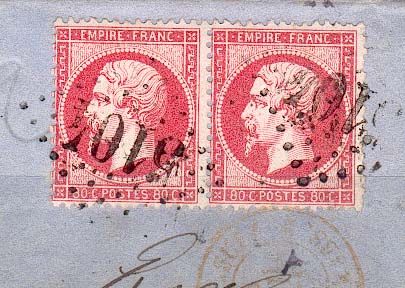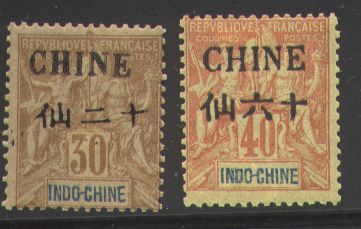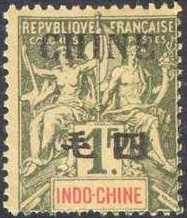 |
|||||
|
|||||
| Preview of Stamps Catalogue: VOLUME 1 |
 |
|||||
|
|||||
| Preview of Stamps Catalogue: VOLUME 1 |
Note: on my website many of the
pictures can not be seen! They are of course present in the catalogue;
contact me if you want to purchase it.
French post offices in China existed from 1862 to
1922. Stamps of France were used initially. The French offices
were:
Shang-Haï (opened in 1862)
Tien-Tsin (opened in 1889)
Han-Kéou (opened in 1898)
Tché-Fou (opened in 1898)
Arsenal Pagoda(?) (opened in 1900)
Pékin (Beijing) (opened in 1900)
Fou-Tchéou (opened in 1900)
Ning-Po (opened in 1900)
Amoy (opened in 1902)
See also: https://en.wikipedia.org/wiki/French_post_offices_in_China
Stamps of France with numeral cancel "5104" of Shanghai:

(Shanghai "5104" cancel used in 1866)
5 c green 10 c black 15 c blue 20 c red on green 25 c black 30 c brown 40 c red 50 c red 75 c lilac on orange 1 F olive 2 F brown on blue 5 F lilac Surcharged
'25' on 1 F olive (1900) Surcharged with fancy letters in red

(Reduced size)
'2 Cents' on 25 c black (1901) '4 Cents' on 25 c black (1901) '6 Cents' on 25 c black (1901) '16 Cents' on 25 c black (1901)
Value of the stamps |
|||
vc = very common c = common * = not so common ** = uncommon |
*** = very uncommon R = rare RR = very rare RRR = extremely rare |
||
| Value | Unused | Used | Remarks |
| 5 c | ** | ** | Two shades of green exist; dark green (type II), yellowish green (type I and II) |
| 10 c | *** | *** | Type I or II |
| 15 c | *** | *** | The paper of this stamp has an underprint |
| 20 c | *** | *** | |
| 25 c | ** | * | |
| 30 c | *** | *** | Type II |
| 40 c | *** | *** | Type II |
| 50 c | *** | *** | Type I or II, an error with a red "Chine" overprint exists (type II) |
| 75 c | RR | RR | |
| 1 F | *** | *** | Type II |
| 2 F | R | R | |
| 5 F | RR | RR | An error with a red "Chine" overprint exists. |
| Surcharged | |||
| 25 on 1 F | RR | RR | 1900 (used in Shanghai only?) |
| 2 c on 25 c | RRR | RR | 1901 |
| 4 c on 25 c | RRR | RRR | 1901 |
| 6 c n 25 c | RRR | RRR | |
| 16 c on 25 c | RR | RR | Error with black overprint: RRR |
For the corresponding types of the basic stamps of France, click here.
I've seen postal stationary in the value 5 c green (with red "CHINE" overprint).



"5104" cancel from Shanghai and "SHANG-HAI
CHINE" cancel of 1896. Also a "CORR.D. ARMEES
SHANG-HAI" cancel of 1895.


(Error, red "Chine" overprint on 50 c and 5 F)
Forgeries exist. For example the forger Francois Fournier made forgeries of the "16 Cents" overprint (see page 165 of the Ragatz version of the Fournier Album). Fournier also made a forgery of the "25" surcharge (it can be seen in one of the last pages of the Fournier Album under "Divers", on the same page 165 of the Ragatz version).

Fournier forged overprints, the "Chine" one is on the
top right.

A forged "Chine" overprint on a 75 c stamp.

Very dubious "Chine" overprint.



5 c green 10 c red 15 c red 20 c brown 25 c blue 30 c lilac 40 c red and blue 50 c brown and grey 1 F red and green 2 F violet and yellow 5 F blue and yellow Surcharged

'5' on 15 c red (1903) Surcharged with value in 'CENTS' or dollars and chinese text (1907)
1 c on 5 c orange (1922) 2 c on 5 c green (2 types) 2 c on 10 c green (1922) 3 c on 15 c orange (1922) 4 c on 10 c red (2 types) 4 c on 20 c brown (1922) 5 c on 25 c lilac (1922) 6 c on 15 c red (2 types) 6 c on 30 c red (1922) 8 c on 20 c brown (2 types) 10 c on 25 c blue (2 types) 10 c on 50 c blue (1922) 20 c on 50 c brown and grey (2 types) 20 c on 1 F red and green (1922) 40 c on 1 F red and green (2 types) 40 c on 2 F orange and blue (1922) 1 $ on 5 F blue and yellow (1922) 2 $ on 5 F blue and yellow (2 types)
These stamps have perforation 14 x 13 1/2. The stamps in the values 10 to 30 are in the design of the 15 c. The values 40 c to 5 F are in the design of the 50 c stamp. These stamps were used in various post offices: Shanghai, Beijing, etc.
Value of the stamps |
|||
vc = very common c = common * = not so common ** = uncommon |
*** = very uncommon R = rare RR = very rare RRR = extremely rare |
||
| Value | Unused | Used | Remarks |
| 5 c | * | * | |
| 10 c | * | * | |
| 15 c | * | * | |
| 20 c | *** | *** | |
| 25 c | *** | ** | |
| 30 c | *** | *** | |
| 40 c | *** | *** | |
| 50 c | *** | *** | |
| 1 F | *** | *** | |
| 2 F | RR | RR | |
| 5 F | RR | RR | |
| Surcharged | |||
| 5 on 15 c | *** | *** | Inverted surcharge: R |
| Surcharged with values in 'CENTS' or dollar | |||
| 1 c on 5 c | *** | *** | |
| 2 c on 5 c | * | * | Small or large overprint |
| 2 c on 10 c | *** | *** | |
| 3 c on 15 c | R | R | |
| 4 c on 10 c | * | * | Small or large overprint |
| 4 c on 20 c | R | R | |
| 5 c on 25 c | *** | *** | |
| 6 c on 15 c | * | * | Small or large overprint |
| 6 c on 30 c | *** | *** | |
| 8 c on 20 c | * | * | Small or large overprint Small overprint exists with '8' inverted: R |
| 10 c on 25 c | * | c | Small or large overprint |
| 10 c on 50 c | R | R | |
| 20 c on 50 c | ** | * | Small or large overprint; Large overprint: RR Small overprint exists triple: RR |
| 20 c on 1 F | RR | RR | |
| 40 c on 1 F | *** | ** | Small or large overprint |
| 40 c on 2 F | RR | RR | |
| 1 $ on 5 F | RRR | RRR | |
| 2 $ on 5 F | R | R | Small or large overprint: Small overprint: RRR |
Forgeries exist (for example the forger Francois Fournier made forgeries of the "5" on 15 c surcharge).

5 c blue 10 c brown 15 c green 20 c green (1903) 30 c red 50 c lilac
Value of the stamps |
|||
vc = very common c = common * = not so common ** = uncommon |
*** = very uncommon R = rare RR = very rare RRR = extremely rare |
||
| Value | Unused | Used | Remarks |
| 5 c | *** | *** | |
| 10 c | *** | *** | |
| 15 c | * | *** | |
| 20 c | *** | *** | |
| 30 c | *** | *** | |
| 50 c | *** | *** | |


50 c with "HOI HAO" cancel (not sure if this stamp is
genuine...); I have seen other stamps pasted on small pieces of
paper with this "HOI-HAO 3E 27 FEVR 06 CHINE" cancel.


(These two images were obtained from a Francois Feldman auction)
5 c green (stamp of 1894) 5 c green (stamp of 1902) 10 c black (stamp of 1894) 10 c red (stamp of 1902) 15 c blue (stamp of 1894) 15 c red (stamp of 1902) 30 c brown (stamp of 1894)
The overprint exists in two types; type 1: small horizontal
overprint (with subtypes 'A' above 'CE' or 'A' above second 'E'
of 'PERCEVOIR', type 2 is printed diagonally (with 2 subtypes
differing in the 'C'). Also different colours were used for the
overprints (red or violet). Inverted overprints also exist. All
these overprints are very rare to extremely rare.
By the way, my 1933 Senf catalogue says that these issues were
mainly speculative stamps, made by the postmaster of Tientsin.
Reprints exist.


Type 1: first subtype (left) and second subtype (right)
Forgeries exist (for example the forger Francois Fournier made forgeries of these overprints).

Primitive forgeries, both the "CHINE" and the "A
PERCEVOIR" overprint are forged. I believe these are modern
fakes.
1 c on 5 c blue (1922) 2 c on 5 c blue 2 c on 10 c brown (1922) 4 c on 10 c brown 4 c on 20 c green (1922) 8 c on 20 c green 10 c on 50 c lilac (1922) 20 c on 50 c lilac
Value of the stamps |
|||
vc = very common c = common * = not so common ** = uncommon |
*** = very uncommon R = rare RR = very rare RRR = extremely rare |
||
| Value | Unused | Used | Remarks |
| 1 c on 5 c | RR | RR | |
| 2 c on 5 c | * | * | |
| 2 c on 10 c | RR | RR | |
| 4 c on 10 c | ** | ** | |
| 4 c on 20 c | RR | RR | |
| 8 c on 20 c | ** | ** | |
| 10 c on 50 c | RR | RR | |
| 20 c on 50 c | *** | ** | |



(Reduced size)
1 c black 2 c brown on yellow 4 c brown 5 c green 10 c red 15 c grey 20 c red on yellow 25 c black 25 c blue 30 c brown 40 c orange 50 c red 50 c brown on blue 75 c lilac 1 F green 5 F lilac
The value is indicated in chinese characters and thus different for each value. Two types exist of these overprints (not all values were printed in both types, type I appeared in 1902, type II in 1904). Type II exists with a slightly larger 'C'.
Value of the stamps |
|||
vc = very common c = common * = not so common ** = uncommon |
*** = very uncommon R = rare RR = very rare RRR = extremely rare |
||
| Value | Unused | Used | Remarks |
Cheapest type |
|||
| 1 c | * | * | |
| 2 c | *** | *** | |
| 4 c | ** | ** | |
| 5 c | ** | ** | |
| 10 c | *** | *** | |
| 15 c | *** | *** | |
| 20 c | R | R | |
| 25 c black | *** | *** | |
| 25 c blue | *** | *** | |
| 30 c | *** | *** | |
| 40 c | *** | *** | |
| 50 c red | RR | RR | |
| 50 c brown on blue | *** | *** | |
| 75 c | *** | *** | |
| 1 F | *** | *** | |
| 5 F | RR | RR | |
Inverted and incomplete overprints were made illegally.



Probably Fournier forgeries; the
vertical and horizonatl perforation does not match in the
corners. Click here for more information.


1 c olive 2 c brown on yellow 4 c lilac on blue 5 c green 10 c red 15 c brown on blue (two types) 20 c red on green 25 c blue 40 c black on grey 50 c brown 1 F olive 2 F lilac on orange 10 F red on green
The value is indicated in chinese characters and thus different for each value. In type II of the 15 c, the word "CHINE" is below the chinese inscription. A subtype exist of these stamps with a larger 'C'.
Value of the stamps |
|||
vc = very common c = common * = not so common ** = uncommon |
*** = very uncommon R = rare RR = very rare RRR = extremely rare |
||
| Value | Unused | Used | Remarks |
| 1 c | * | * | |
| 2 c | * | * | |
| 4 c | RRR | RRR | |
| 5 c | * | * | |
| 10 c | *** | *** | |
| 15 c | ** | ** | Type II: *** |
| 20 c | *** | *** | |
| 25 c | *** | *** | |
| 40 c | *** | *** | |
| 1 F | RR | RR | |
| 2 F | R | R | |
| 5 F | RR | RR | |